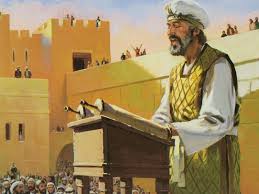Ezra’s Reforms
Ezra 9:1 to 10:44 and Nehemiah 7:73b to 9:37
After the completion and dedication of the Temple in 515 BC, a silence of fifty-seven
years followed. And when the curtain rose again the power was largely in the hands of
the priesthood. Religious energy had become exhausted. Intermarriage with pagans was tolerated and frequent, and the priests were among the chief offenders. The upper class oppressed the poor; the Sabbath was desecrated and the tithes were withheld.

The importance of Ezra’s reforms lay primarily in the removal of the Torah from the exclusive possession of the priests and its becoming the common property of the nation as a whole. Its dissemination put an end to what had become the monopoly of a class. The reading of the Torah of Moses so pierced the heart of the nation that it became a safeguard against idolatry, and set the standard for social life, as well to the Jews of the diaspora as to the Jews in Judea. Ezra’s reforms marked the triumph of Judaism over the decline into paganism.
However, there was a black cloud in the silver lining. When Ezra returned from the Babylonian captivity, he recognized that the Israelites had spent seventy years in exile because they had violated the Torah (see the commentary on Jeremiah, to see link click Gu – Seventy Years of Imperial Babylonian Rule). They had broken the commandments of Moshe, especially in the area of idolatry. So Ezra set up what was known as the School of the Sophim. Sophar is singular for Sophim and means scribe. He gathered the scribes together in one school. They began to go through each of the 613 commandments in the Torah and expound on them. They would discuss each commandment at length, what was involved in keeping it and what was involved in breaking it. The theory was that if they gave the Jewish people a clear understanding of what each commandment was and how to keep it, that they would do so. In that way they hoped to avoid any further discipline from ADONAI like the Babylonian captivity. Therefore, the original intent was very honorable, and if they had stopped there everything would have been well and good. Hosea said that the people are destroyed from lack of knowledge (Hosea 4:6). So Ezra and the other scribes wanted to eliminate any lack of knowledge. However, the first generation of Sophim passed away.
The second generation of Sophim took their task more seriously. They said it was not merely good enough for them to expound upon the commandments. They used the imagery (or word picture) of building a fence around the Torah (Hebrew se’ag la-Torah) with new rules and regulations because they wanted to protect it. Their thinking was that the Jews might break the new rules and regulations of the outer fence, but that would keep them from breaking one of the original 613 commandments (actually 365 prohibitions and 248 commandments) and bring divine discipline upon the nation of Isra’el again, as in the Babylonian captivity. The rabbis taught that Moshe received [the Oral Law] from Sinai and handed it on to Joshua, and Joshua to the elders, and the elders to the prophets and the prophets handed it on to the men of the Great Assembly (Pirke Avot 1:1), or the Great Sanhedrin (see the commentary on The Life of Christ Lg – The Great Sanhedrin).
With all the best intentions they began to work on these new rules and regulations. Over a four-hundred year period, this became known as the Oral Law (see the commentary on The Life of Christ Ei – The Oral Law). The Oral Law refers to the Talmud, which is a compilation of rabbinic commentaries on the first five books of Moses, called the Torah. The Talmud, completed around 500 AD, consists of the Mishnah and well as commentary on the Mishnah called Gemara (Mishnah + Gemara = Talmud). The tradition grew to include a further compendium called Midrash until about the 12th century. The rabbis taught that when the Messiah came, He would not only believe in the Oral Law, but He would participate in the making of new Oral Laws (Gen.R. 98:9; Tanh.Vaychi 10).
When Christ was born, this common belief was in all of Isra’el, both with the priesthood and the common people. Therefore, with the best intentions, they believed that someone not under the authority of the Oral Law could not possibly be the Messiah. And the unintended consequence of their actions was that their traditions were elevated to a position they were never intended to have. As a result, Jesus would have nothing to do with the Oral Law because He knew that He was not the author. It was man-made.151 And because He rejected it, the Great Sanhedrin rejected Him.



Leave A Comment